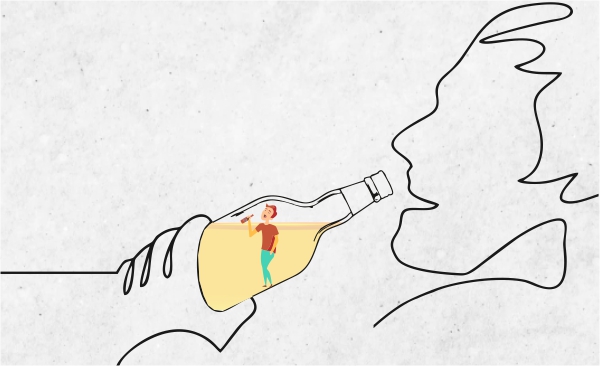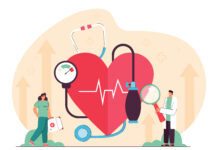At first, you may feel happy and stress-free about drowning your sorrows in a drink. After several drinks, your words will start slurring. By the end of the night, you will barely be standing straight with no coordination between the body and brain and struggling to keep your eyes open. It’s okay to wobble home on rare occasions, but if you are a regular drinker, alcohol affects your health in more severe ways than this. It is bound to give you more than just a hangover.
How much is too much?
While not everyone who enjoys an occasional drink will become alcoholic, this type of drinking behaviour increases the risk of harmful health consequences. Moderate drinking involves one drink for women per day and two drinks for men per day. Binge drinking is when in one sitting, you chug down four or more drinks (women) or five or more drinks (men). Extreme binge drinking is twice or higher than the gender-wise binge drinking baseline. You are a heavy drinker, if you enjoy 8 or more drinks per week (women) or 15 or more drinks per week (men). Also, it goes without saying that if you are younger than 21 years or pregnant, alcohol should not be on your menu at all. A binge or heavy drinker may notice the health effects of alcohol sooner, but moderate drinking also poses health risks.
A peg a day shrinks your brain away…
Experts claim that moderate drinking has protective health benefits. But latest research suggests that even one drink everyday is capable of reducing your brain size. As we age, our brain ages too, but for a heavy drinker, alcohol is like a spirit to the fire in the ageing process. It reduces the size, shape and functioning of brain cells at a faster pace. This affects everything your brain does: ability to think, learn, reason, remember, react, respond, deduce, make decisions, use logic…basically your overall cognitive performance.
In India, alcohol leads to 40% of all road accidents. This is a demonstration of one short-effect of alcohol on your brain activity. Just imagine the damage that has already been done inside so far. So, think before your next drink.
Mental health and losing your mind
Don’t let those initial happy feelings fool you. They fade away as fast as they hit. The chemical changes in your brain lead to more negative feelings, and you’ll soon find yourself depressed, anxious, angry or emotionally charged. Even small things around can tick you off. Heavy drinking over long periods affects your emotions, mood, thinking paradigm and entire personality. It affects your overall mental health and can induce symptoms like bipolar disorder.
Drinking before going to bed helps you sleep better
This is probably the biggest myth you will ever hear and believe.
Alcohol is a sedative. It allows you to fall asleep faster but not peacefully. Alcohol is hard to break down. Your body processes it throughout the night based on the amount consumed. It disturbs your rapid eye movement (REM) sleep, which is absolutely vital to restore mind and body. REM sleep is a phase where we dream the most, and disturbed REM means high chances of vivid nightmares. For instance, any noise or movement in the room can feel like a part of a dream to your mind. Once the effects of alcohol wear off, you’ll find yourself tossing and turning in bed, getting up to pee multiple times and feeling drowsy the next day.
The gut feeling
Stomach is the first organ to have a long contact with alcohol in your body. The side effects of alcohol on the stomach only appear when the damage is done. Unlike other foods, alcohol directly enters your bloodstream from the stomach lining. Once inside the blood system, it is free to destroy everything it comes in contact with. The direct impact is on the liver, pancreas and large intestine. In the short term, heavy drinking gives you gas, bloating, diarrhoea or constipation. Over the years, you can develop painful stomach ulcers and gastritis (irritation of the stomach lining). Additionally, since alcohol is hard to break down, it increases acid content in the digestive tract which gradually raises into your throat. This causes heartburn and makes you throw up if you have lost the count of your drinks.
Is it really good for your heart?
It still remains debatable if moderate drinking is good for your heart health, especially wine. But the catchphrase here is ‘moderate drinking’, and you sure don’t need to pop a bottle every night to reap all the benefits.
An occasion of binge drinking is capable of disturbing cardiac electrical signals, which are needed to pump out blood. Prolonged consumption of alcohol causes disturbed blood circulation, arrhythmia (irregular heartbeats) and high blood pressure. It also stretches and weakens your heart muscles and increases the risk of stroke, heart attack, heart failure and cardiovascular diseases. Since alcohol contains high amounts of calories, it leads to weight gain, obesity and an endless list of cardiac and other health conditions.
Paving way to liver diseases
The relationship between liver and alcohol is probably more toxic than your ex. Although the stomach breaks down some of the alcohol ingested, the majority of it is broken down by the liver. The liver mainly filters out blood and removes toxins from the body. Alcohol breakdown generates lots of toxins and carcinogens, including acetaldehyde. This substance is a poison to cells as it induces inflammatory changes and DNA damage.
Regular drinking builds up excess fat in your liver, making it thicker and fibrous. This excess fat limits the supply of fresh blood to the liver, and the organ fails to gain required nutrients to survive or function to its full capacity. Every time the liver filters alcohol, some cells die off. Several alcohol-related liver diseases can appear over time, including fatty liver, alcoholic hepatitis and cirrhosis.
How alcohol affects your pancreas
Although it remains a mystery as to how alcohol damages the pancreas, one theory is that alcohol molecules interfere with the functioning of pancreatic cells. The pancreas normally produces enzymes and hormones (including insulin and glucagon) and releases them into the bloodstream. The interference affects this production and release. Alcohol toxins and stored-up substances make the pancreas digest itself, causing inflammation and severe damage.
Normally, when blood sugar is high, the pancreas secretes insulin. When blood sugar is low, it secretes glucagon. A proper balance of blood sugar is very important for proper bodily functions. But the damage from alcohol does not allow your body to make enough or effective insulin, which increases the risk of diabetes.
You’ll know it in your bones
Pancreatic damage affects the absorption of calcium and vitamin D, both important for healthy bone development. Without them, your bone density decreases. Bones get thinner, weaker and porous, putting you at risk of bone fractures and osteoporosis. In men, heavy drinking produces less testosterone, a hormone associated with osteoblasts (cells that help bone formation). In women, heavy drinking decreases oestrogen, a hormone needed for bone strength. This is why in women, bone loss is common during menopause as oestrogen levels decline naturally.
On an obvious note, the more you drink, the higher your chances of falling due to impaired brain–body coordination. This also increases the risk of fractures.
Hearing loss…What did you say?
In case you haven’t heard, alcohol impairs your hearing. The auditory nerve in the ear transfers the sound we hear to the auditory cortex in the brain for processing. Heavy drinking damages the nerve and cortex both. Alcohol also alters the composition and volume of inner ear fluid and disrupts tiny hairs inside. Temporary or permanent hearing loss is thus common after drinking. You must have noticed how sometimes having one-too-many drinks leaves a ringing in your head and ears.
Sexual and reproductive health
You might think that drinking alcohol spices up fun in the bedroom. However, in reality, heavy drinking reduces sex drive and production of sex hormone. In men, it affects sperm quality and causes erectile dysfunction. In women, it causes difficulty conceiving and orgasmic latency and affects ovarian reserve and menstrual cycle, increasing the risk of infertility.
Writer Victor Hugo once said
‘The wise man is he who knows when and how to stop’
Our body is constantly talking to us, whether we are aware of it or not. It gives us signals if something is not right within. If you pay attention, you’ll know it’s tired of your drinking habits. It needs your attention and care. Instead of staying late cranking up another bottle, re-evaluate your lifestyle and make healthy changes. It is never too late to start over. Moreover, make room for preventive healthcare as it not only saves money and time but also lives.
Testing at Thyrocare
Sobriety is a journey, not a destination. For this, you need to know the damage alcohol has done to your body till date. Thyrocare has launched Alcohol Impact Checkup and Alcohol Impact Checkup Advanced packages that evaluate 60+ parameters at affordable prices. The profiles help you understand the impact of alcohol on your health, so you can start taking the required steps.
Get tested today!







